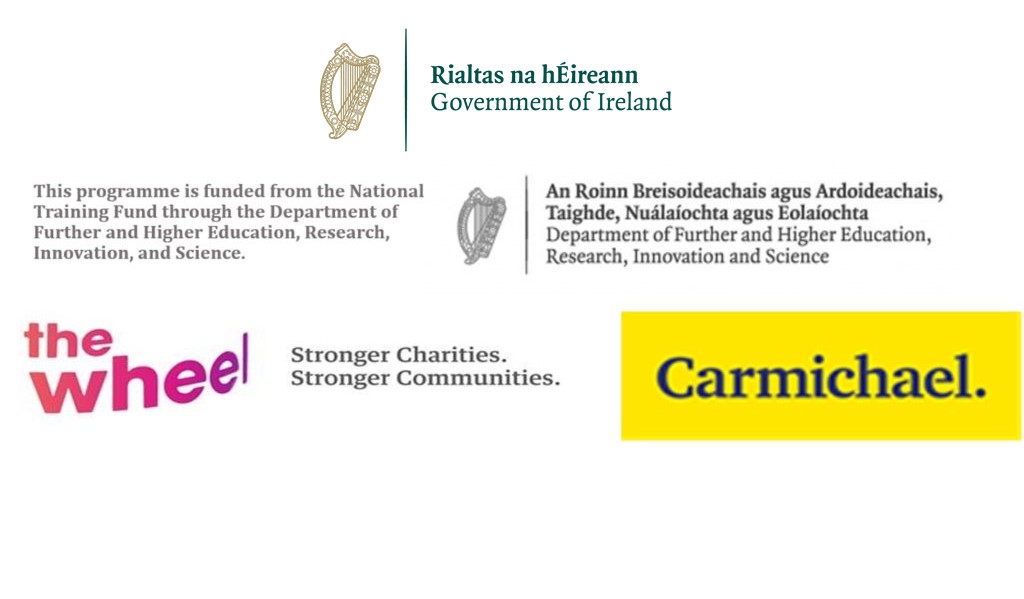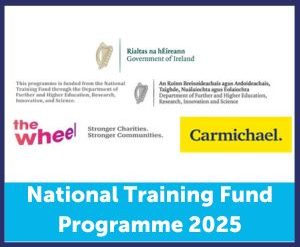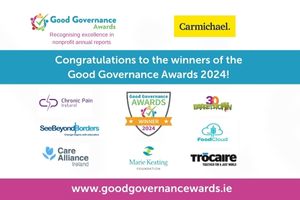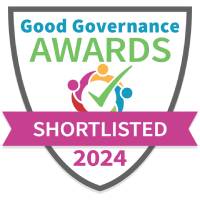Succession Planning
Target Audience
Board members and senior managers: people with responsibility for human resources, strategy and organisational risk.
Outline
Topics Covered:
- Rationale for Succession planning.
- Succession planning and organisational risk.
- Characteristics of effective Succession Planning.
- Identification of Succession Plan targets
- Network Analysis
- Approaches to Succession Planning.
- Sustainable Succession Planning
Duration 10am – 12.30pm.
Methodology
Via Zoom.
The funding for the provision of these services comes from the National Training Fund administered by the Department of Further and Higher Education, Research Innovation and Science. The €10 nominal charge is by way of contribution. Participants will be asked to provide further information regarding Age Range, Gender, Employment Status, Educational Background, Role in Organisation, Organisation Activity & Size post registration.

Dealing with Difficult Situations
Target Audience
Board members and managers: people with responsibility for human resources.
Aim
To assist participants in being able to deal with situations that may cause anxiety, discomfort or stress.
Outline
Difficult situations are inevitable, and can occur without warning, or, in some organisations, regularly. Having a strategy prepared which helps us to respond rather than react will help both parties achieve a satisfactory (win-win) outcome. The session will be highly interactive, with group work and pairs exercises designed to enable participants maximise their learning.
Duration 9.45am – 4.00pm
Lunch will be provided.
Methodology
In-person, Carmichael Centre, Dublin 7.
The funding for the provision of these services comes from the National Training Fund administered by the Department of Further and Higher Education, Research Innovation and Science. The €10 nominal charge is by way of contribution. Participants will be asked to provide further information regarding Age Range, Gender, Employment Status, Educational Background, Role in Organisation, Organisation Activity & Size post registration.

Dealing with Difficult Situations
Target Audience
Board members and managers: people with responsibility for human resources.
Aim
To assist participants in being able to deal with situations that may cause anxiety, discomfort or stress.
Outline
Difficult situations are inevitable, and can occur without warning, or, in some organisations, regularly. Having a strategy prepared which helps us to respond rather than react will help both parties achieve a satisfactory (win-win) outcome. The session will be highly interactive, with group work and pairs exercises designed to enable participants maximise their learning.
Duration 9.45am – 4.00pm
Lunch will be provided.
Methodology
In-person, Carmichael Centre, Dublin 7.
The funding for the provision of these services comes from the National Training Fund administered by the Department of Further and Higher Education, Research Innovation and Science. The €10 nominal charge is by way of contribution. Participants will be asked to provide further information regarding Age Range, Gender, Employment Status, Educational Background, Role in Organisation, Organisation Activity & Size post registration.

Bullying Complaints – Guidelines for Investigations. In-person
Target Audience
Board members and managers: people with responsibility for human resources.
Outline
This is a practical workshop with toolkits available to utilise in an investigation and sample reports.
Topics covered:
- Defining bullying and characteristics of bullying
- Policies and procedures
- Scoping the complaint
- Identification of relevant parties
- Identification of risk
- Limits of confidentiality
- Impartiality
- First contact
- Meeting recommendations
- Report writing recommendations
- Sign off recommendations
- Fallout and risk factors for the investigator
Duration 9.45am – 4.00pm. Lunch will be provided.
Methodology
In-person, Carmichael Centre, Dublin 7.
The funding for the provision of these services comes from the National Training Fund administered by the Department of Further and Higher Education, Research Innovation and Science. The €10 nominal charge is by way of contribution. Participants will be asked to provide further information regarding Age Range, Gender, Employment Status, Educational Background, Role in Organisation, Organisation Activity & Size post registration.
Leaders, Managers & Management Teams
Target Audience
CEOs, Managers, Members of Management Teams, or anyone interested in any of these roles.
Outline
Very often the structure within non-profit organisations is to have the CEO of the organisation lead a Management Team made up of Managers of certain functions within the organisation. Members of the Board hold all Managers & Staff to account through the CEO who reports directly to them. But what does it mean to be a Manager, and a member of a Management Team, or a Leader?
Content
Teams
- Understanding team/group dynamics.
- Stages in the development of groups.
- What groups expect from leaders.
- How groups/contexts can determine our leadership approach.
Leadership
- Defining leadership: What is it? What is it in the context of non-profits?
- Examples of great leaders.
- How leadership relates to vision, impact, transformation, strategy.
- Leadership styles and when to apply them.
- Examples of leading non-profits
- Being a leader
Management
- Defining management: What is it? What is it in the context of non-profits?
- Differentiating between management and leadership.
- What managers do.
- Manager’s role in the wider organization.
- Managers and operational planning for non-profits
- Management styles
Poise
- Self-awareness
- Other awareness
- Coaching others/groups
- Coaching ourselves
Application
- Choosing three key learning points from the session.
- What will I do differently?
- When will I do it?
Methodology
Delivered virtually via Zoom.
The funding for the provision of these services comes from the National Training Fund administered by the Department of Further and Higher Education, Research Innovation and Science. The €10 nominal charge is by way of contribution. Participants will be asked to provide further information regarding Age Range, Gender, Employment Status, Educational Background, Role in Organisation, Organisation Activity & Size post registration.

Effective Leadership & Management of Teams
All too often volunteer leaders/trustees and employees in the non-profit sector can find themselves in management and leadership roles without having a full understanding of what such roles actually involve. Furthermore, it is frequently the case that no further training or support is offered to people in these demanding positions.
The recently published OECD Skills Strategy for Ireland identified the need for continuous improvement of leadership and management skills within non-profit sector in Ireland. Strong leadership and management capabilities are important drivers of organisational change, helping to optimise the use of skills in workplaces and drive innovation, productivity and organisation performance. Previous studies have highlighted a need to improve management capability in Ireland, particularly among small and medium-sized enterprises. The OECD Strategy recommended extending flexible, subsidised, customisable development opportunities available to Ireland’s managers to maximise the accessibility, relevance and value of support:
- Address gaps in management training for mid-sized, locally traded service companies and community, voluntary and social enterprises.
- Advance new flexible, subsidised and customisable management training and scale up successful existing programmes.
Target Audience
Board Members, CEOs, Managers, Members of Management Teams, or anyone interested in any of these roles.
Outline
Very often the structure within non-profit organisations is to have the CEO of the organisation lead a Management Team made up of Managers of certain functions within the organisation. Members of the Board hold all Managers & Staff to account through the CEO who reports directly to them. But what does it mean to be a Manager, and a member or a leader of a Management Team, or a Leader of a group of people on your Board?
This 3-part online Leadership Programme will be comprised of:
- Leadership: From what makes an effective leader to developing your own leadership style.
- Team Building: From what makes a highly functioning team to how to motivate teams and attract people to join them.
- Developing your personal skills and getting access to tools for leadership, management and team building.
The schedule for this programme is:
- Tuesday 16/09/2025 6:30pm-9pm
- Tuesday 30/09/2025 6:30pm-9pm
- Tuesday 14/10/2025 6:30pm-9pm
Methodology
Via Zoom.
The funding for the provision of these services comes from the National Training Fund administered by the Department of Further and Higher Education, Research Innovation and Science. The €100 nominal charge is by way of contribution. Participants will be asked to provide further information regarding Age Range, Gender, Employment Status, Educational Background, Role in Organisation, Organisation Activity & Size post registration.
Strategic Planning Support
Strategic planning is necessary to determine the direction of your organisation. It focuses your efforts and ensures that everyone in the organisation is working towards a common goal. It also helps you agree actions that will help to improve the lives of your beneficiaries, focus on your funders requirements and contribute to the sustainability of your organisation.
Approach
Carmichael will work with your organisation on a 1-1 basis offering a customised support package during the course of 2025 with a view to helping your organisation to develop a Strategic Plan.
Target audience
- Charities, community groups/voluntary organisations/social enterprises registered in the Republic of Ireland
- Places are restricted to organisations with an annual turnover of less than €500,000.
- A small group (2-3) of representatives (staff/directors/trustees) with sufficient seniority per organisation committed to reviewing, setting, or influencing the direction and priorities for an organisation.
When booking online, only enrol one person and pay one €100 fee, we will subsequently be in touch with you for information regarding other participants from your organisation. The option to avail of the NTF Impact Management Support Programme 2025 is available to 4 organisations only.
Format
- Preparation for and delivery of an initial Zoom introductory session per organisation to clarify what is involved in strategic planning and the steps involved. Discuss your current strategy and aims. Discuss the key elements of a strategic plan: your vision, your mission, your values, an understanding of the landscape and your place within it, setting goals and objectives, measuring outcomes and KPIs. Walk through the different sections of a strategic plan and implementation plan based on a templates for completion by the organisation. Brainstorm key messages and implications.
- Subsequently agree timelines for the production of the strategic plan including an implementation plan and further Zoom sessions to discuss and review objectives, strategic goals and confirm priorities and sign off on Strategic Plan
- Review drafts prepared by the organisation and give feedback.
- The facilitator’s main support will be in advising and giving feedback on drafts produced by the organisation and mentoring
- Timelines for engagement on early and developed drafts to be agreed between the organisation’s main contact and our facilitator. A maximum of 20 hours support will be provided to any one organisation.
Methodology
Via Zoom.
The funding for the provision of these services comes from the National Training Fund administered by the Department of Further and Higher Education, Research Innovation and Science. The €100 nominal charge is by way of contribution. All participants will be asked to provide further information regarding Age Range, Gender, Employment Status, Educational Background, Role in Organisation, Organisation Activity & Size post registration.
 Annual Reporting Support
Annual Reporting Support
Carmichael has delivered a large number of half day workshops on Annual Reports to many groups of organisations nationwide in recent years and we believe that while such workshops deliver some success, many organisations still struggle to turn that learning into the development of quality Annual Reports. We can also see from our experience with the Good Governance Awards that there are very few submissions from the smaller organisations.
Approach
The annual report represents a real opportunity for organisations in the nonprofit sector across Ireland to showcase their transparency and trust by outlining their performance, governance, culture and financials. An annual report can provide a comprehensive picture of a nonprofit organisation, as well as its achievements and future plans rather than meagrely meeting minimum compliance requirements. An annual report serves to reinforce relationships with stakeholders and build relationships with the public, potential donors, volunteers and supporters.
Carmichael will work with your organisation on a 1-1 basis offering customised support in 2025 with a view to helping you develop the best Annual Report that you can.
Target audience
- Charities/community groups/voluntary organisations/social enterprises in the Republic of Ireland. Organisations that have been shortlisted for Carmichael’s Good Governance Awards at any time in the past will not be included.
- Places are restricted to organisations with an annual turnover of less than €500,000.
- A small group (2-4) of representatives with at least one staff member and at least one director/trustee with sufficient seniority per organisation.
When booking online, only enrol one person and pay one €100 fee, we will subsequently be in touch with you for information regarding other participants from your organisation. The option to avail of the NTF Annual Report Support Programme 2025 is available to 3 organisations only.
Format
Initial two-hours Introductory session(s) per Organisation to cover:
- Walk through of the different sections of an annual report.
- Planning & preparation – determining the format.
- Telling the organisation’s story and its impact of its work.
Subsequent to the above session the group and the facilitator will agree timelines for the production and reviewing of drafts of the Report. The facilitator’s main support will be in advising and giving feedback on drafts produced by the organisation.
Timelines for engagement on early and developed drafts to be agreed between the organisation’s main contact and our facilitator. A maximum of 10 hours support will be provided to any one organisation.
Methodology
Via Zoom.
The funding for the provision of these services comes from the National Training Fund administered by the Department of Further and Higher Education, Research Innovation and Science. The €100 nominal charge is by way of contribution. All participants will be asked to provide further information regarding Age Range, Gender, Employment Status, Educational Background, Role in Organisation, Organisation Activity & Size post registration.
Bullying Complaints – Guidelines for Investigations. In-person
Target Audience
Board members and managers: people with responsibility for human resources.
Outline
This is a practical workshop with toolkits available to utilise in an investigation and sample reports.
Topics covered:
- Defining bullying and characteristics of bullying
- Policies and procedures
- Scoping the complaint
- Identification of relevant parties
- Identification of risk
- Limits of confidentiality
- Impartiality
- First contact
- Meeting recommendations
- Report writing recommendations
- Sign off recommendations
- Fallout and risk factors for the investigator
Duration 9.45am – 4.00pm. Lunch will be provided.
Methodology
In-person, Carmichael Centre, Dublin 7.
The funding for the provision of these services comes from the National Training Fund administered by the Department of Further and Higher Education, Research Innovation and Science. The €10 nominal charge is by way of contribution. Participants will be asked to provide further information regarding Age Range, Gender, Employment Status, Educational Background, Role in Organisation, Organisation Activity & Size post registration.
Succession Planning
Target Audience
Board members and senior managers: people with responsibility for human resources, strategy and organisational risk.
Outline
Topics Covered:
- Rationale for Succession planning.
- Succession planning and organisational risk.
- Characteristics of effective Succession Planning.
- Identification of Succession Plan targets
- Network Analysis
- Approaches to Succession Planning.
- Sustainable Succession Planning
Duration: 10am – 12.30pm
Methodology
Via Zoom.
The funding for the provision of these services comes from the National Training Fund administered by the Department of Further and Higher Education, Research Innovation and Science. The €10 nominal charge is by way of contribution. Participants will be asked to provide further information regarding Age Range, Gender, Employment Status, Educational Background, Role in Organisation, Organisation Activity & Size post registration.




